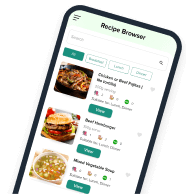In Australia, the terms “dietitian” and “nutritionist”, are often used interchangeably for those who seek guidance on their dietary choices. The two professions have distinct roles and qualifications, each contributing uniquely to the promotion of good health and well-being. In this article, we will investigate the differences between dietitians and nutritionists, their roles, and the educational paths required to pursue these professions.
Navigating Nutritional Wellness
In summary, while dietitians and nutritionists share a common goal of promoting healthy eating habits, the distinctions in education, training, and scope of practice are essential to understand. Dietitians, as regulated healthcare professionals, undergo comprehensive training to provide specialised advice for individuals with specific health conditions. Nutritionists, with a broader focus on general nutrition education, may have diverse educational backgrounds and varying levels of expertise.
Ultimately, whether seeking guidance from a dietitian or nutritionist, individuals should consider their specific needs and health concerns to make informed choices about their dietary well-being. Both professions contribute significantly to the health and nutrition landscape in Australia, offering valuable services to individuals and communities alike.
Get the ME for Me APP today. For a healthier tomorrow.
What is a Dietitian?
A dietitian is a qualified healthcare professional who specialises in the field of dietetics. Undergoing rigorous academic and practical training to provide evidence-based nutritional advice and interventions to individuals, communities, and institutions. In Australia, dietitians are recognised by the Dietitians Association of Australia (DAA) and are regulated by the Australian Health Practitioner Regulation Agency (AHPRA).
Dietitians play a crucial role in the prevention and management of various health conditions through personalised nutrition plans. They work in diverse settings, including hospitals, clinics, community health centers, and private practices. Dietitians often collaborate with other healthcare professionals to ensure comprehensive care for patients.
What is a Nutritionist?
A nutritionist is a professional who focuses on the broader aspects of nutrition and its impact on overall health.
Nutritionists may work in various settings, including community health programs, wellness centres, and the food industry. Their expertise encompasses a wide range of topics, such as general nutrition education, public health initiatives, and lifestyle counseling.
The Difference Between a Dietitian vs Nutritionist
“Both nutritionists and dietitians work towards a common goal of helping people improve their health through diet. Dietitians are in fact nutritionists who do dietetics as a specialisation on top of their nutrition studies. This added qualification allows dietitians to provide more specialised services and medical advice and are also able to work in medical centres and hospitals. Dietitians go through more standardised training than nutritionists.”
Monique Etkind
Registered Dietitian
BSc Nut & Diet, APD,AN
While dietitians and nutritionists both share an interest in promoting healthy eating habits, there are distinct differences between the two professions. One key difference lies in the level of education and training required.
Dietitians
Dietitians are highly trained professionals with a recognised qualification in dietetics. They must complete a relevant university degree, followed by supervised practical experience and, in many cases, pass a national examination. Dietitians are equipped to work with individuals with specific health concerns, such as diabetes, heart disease, and gastrointestinal disorders.
Nutritionists
On the other hand, the term “nutritionist” does not always have standardised qualifications. While some nutritionists hold degrees in nutrition or related fields, others may have completed short courses or gained knowledge through self-study. Consequently, the expertise and scope of practice among nutritionists can vary significantly.
What Do Dietitians and Nutritionists Do?
Dietitians and nutritionists both play crucial roles in promoting health and well-being, but their day-to-day responsibilities may differ.
Dietitians:
- Conduct detailed nutritional assessments of individuals with specific health concerns.
- Develop personalised nutrition plans based on scientific evidence and clinical research.
- Work in collaboration with medical professionals to manage and prevent various health conditions.
- Provide nutritional education and counseling to individuals and groups.
- Stay updated on the latest research and guidelines in the field of dietetics.
Nutritionists:
- Offer general nutrition advice and education to individuals or communities.
- Focus on promoting healthy eating habits and lifestyle choices.
- Work in settings such as schools, community centers, or wellness programs.
- Provide support for individuals seeking guidance on weight management or improving overall health.
- May work in the food industry, contributing to product development or marketing.
What Do You Need to Study to Become a Dietitian or Nutritionist?
Becoming a dietitian or nutritionist involves specific educational pathways.
Dietitian:
- Obtain a Bachelor’s degree in Nutrition and Dietetics or a related field.
- Complete a supervised practical placement to gain hands-on experience.
- Some universities may require additional postgraduate studies or a Master’s degree in Dietetics.
- Pass the accreditation examination administered by the Dietitians Association of Australia (DAA).
- Register with the Australian Health Practitioner Regulation Agency (AHPRA) to practice as a dietitian.
Nutritionist:
- Obtain a Bachelor’s degree in Nutrition, Dietetics, or a related field.
- Some nutritionists may choose to pursue additional certifications or postgraduate studies for specialised knowledge.
- While not mandatory, joining a professional association, such as the Nutrition Society of Australia, can enhance professional credibility.
- Gain practical experience through internships or entry-level positions.
- Continue professional development to stay informed about the latest trends and research in nutrition.







